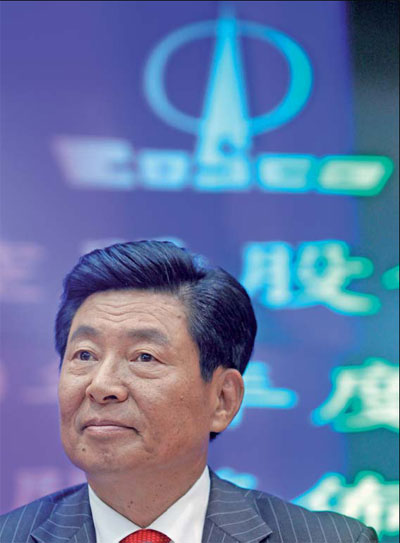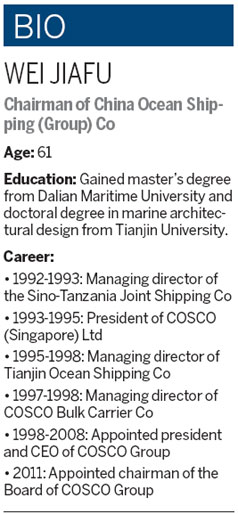A captain fully in charge
Updated: 2011-12-30 07:43
By Zhang Yuwei (China Daily)
|
||||||||
|
COSCO Chairman Wei Jiafu says that the US should create a more favorable business environment for Chinese investors. [Dale De La Rey / Bloomberg] |
Chinese shipping boss wins accolades, friends in the US for improving better business relations
At a time of slow recovery and high unemployment, China's role in helping to boost the United States economy has become more obvious. This is more recognized in states where Chinese companies have left good footprints with its investment records. China Ocean Shipping (Group) Co (COSCO) is one of them.
In 2002 the Port of Boston was facing a shutdown when the shipping giant Moeller-Maersk Group canceled its services to the port. The Massachusetts state government invited COSCO, one of the world's largest liner shipping companies, to invest and help. Led by its current chairman Wei Jiafu, COSCO negotiated a deal with the Massachusetts state and opened a route from Boston directly to Chinese ports. The contract immediately saved about 9,000 dockworkers' jobs in the New England area.
"COSCO offered a helping hand then and the (Massachusetts) state and people there really appreciated it," recalls Wei, 61, who has more than 10 years' sailing experience as a commercial shipping captain.
Wei is a familiar figure in the US. In 2009 BusinessWeek listed him among the 40 Most Influential People in China, and he has received a number of awards in the US, including the honor of Guardian of American Workers from the International Longshoremen's Association and Honorary Chief Commander with Four Star rank of Massport Police from the Association of American Port Authorities security committee and Massachusetts Port Authority.
As president of COSCO from 1998 to 2008, Wei built the shipping company into one of the world's biggest logistics providers with $17 billion (13 billion euros) in revenue and more than 800 ships. He was recently appointed COSCO's chairman of the board.
COSCO has more than 15 regular container services covering both the west and east coasts of the US. Over the years the company has created more than 16,000 jobs in the country.
This year COSCO was ranked 398th in the Fortune Global 500 by Fortune magazine, with revenue of $24 billion and a profit of $1 billion last year.
Wei, a senior engineer with a doctoral degree in naval architecture and a master's degree in shipping management, has extensive knowledge in international shipping management and operations.
He says he expected the global container shipping market to grow between 8 to 10 percent this year to reach 150 million 20-foot equivalent units. And the global demand for dry bulk shipping, he says, will grow about 6 percent this year, with China's strong demand for iron ore, coal and grains.
|
|
The US should open more ports on the east coast to generate more shipping businesses, he says. But to do that, he says, US ports need to improve their infrastructure to be able to handle the world's increasingly large container ships.
"The US should increase its investment in port facilities and port dredging systems, and reduce port and inland transport costs and assist shipping companies more," he says.
"The best way to do that is to cooperate with Chinese shipping companies to build up the infrastructure on the ports on the east coast to increase more shipping activities."
Wei says the Obama administration's policy to encourage infrastructure investment to stimulate the economy is a good opportunity for US shipping companies to improve facilities.
"It is also a good opportunity for the US government to loosen the restrictions to attract foreign investment."
Wei says COSCO's bulk and general cargo fleet play an important role in grain and steel transport between the US and China. COSCO has also established several solely invested companies and joint ventures in the US to provide inland transport and logistics transport services.
Wei says he experienced doubts from Americans when the company first appeared in the US more than 10 years ago.
"The sentiment then was very different," he recalls, adding Boston was a turning point for COSCO.
"They had doubts over COSCO because it is State-owned and because (American) people had too little knowledge about China and Chinese companies. They often wondered what they (the Chinese companies) were doing here (in the US)."
But that soon changed when "you can show them with real actions", he says.
"Americans are realistic - it is part of their culture, and it is a good thing. They see what we have done, and they started to accept us."
In 2009 Senator John Kerry of Massachusetts, the 2004 Democratic presidential nominee, proposed a resolution in Congress to commend Wei and COSCO for increasing business relations between the US and China, and later presented him the Job Creation Award.
In the same year the Connecticut Maritime Association awarded Wei the Commodore Award to recognize COSCO's contribution. The award is given each year to a person in the international maritime industry who has contributed to the growth and development of the industry.
"Throughout his career, Captain Wei's commitment to the American workforce has been unwavering," says Stephen Lynch, a Massachusetts congressman, adding that COSCO is the largest Chinese employer of American citizens.
"Captain Wei is truly a 'People's ambassador' to the United States of America," he said.
Most recently, Wei was invited to take part in the Asia-Pacific Economic Cooperation forum in Hawaii, where he urged the US to create a more favorable business environment for Chinese investors.
China's role is particularly important now in the difficult times in the world economy, he said, citing the slow US economy, the European debt crisis, and the political turmoil in North Africa and the Middle East.
"If the US wants to create more jobs and stimulate its economy, one thing it can do is to create a more favorable business environment to attract more Chinese investments," he said.
The US, he said, should loosen the limits it has placed on exports of high technology to China and invite more Chinese companies to invest in the country.













